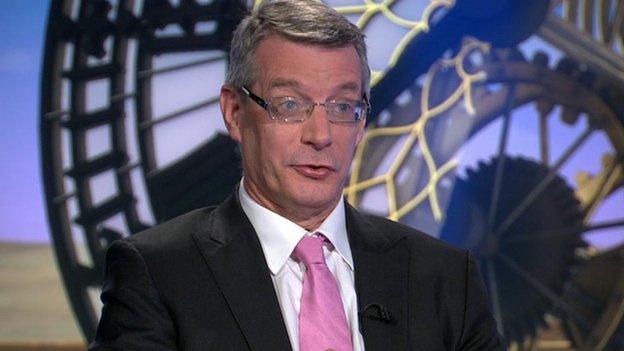Scottish independence: Sturgeon says EU membership 'common sense'
- Published
Nicola Sturgeon talks to Andrew Marr
Deputy first minister Nicola Sturgeon has said Scotland's membership of the EU after a "Yes" vote for independence is a "common sense" position.
The SNP's deputy leader told the BBC's Andrew Marr show that no government in Europe had "even come close" to saying they would veto Scotland's membership.
Ms Sturgeon said even Labour MEP David Martin agreed Scotland would join.
Mr Martin told the BBC that Scotland would get EU membership "eventually" but there would be a "hiatus".
He said it was "nonsensical" to think that membership could be negotiated in 18 months as the Scottish government has proposed.
Opponents of independence have previously said that an independent Scotland would be forced into lengthy negotiations over European Union membership and would have to accept terms which included joining the European single currency and the Schengen agreement on border controls.

David Martin said EU membership negotiations would "take a long time"
The Sunday Herald quotes Mr Martin, external, one of Scotland's two Labour MEPs in the last parliament, who supports the "No" campaign, saying: "My view is that Scotland, of course would get into the EU eventually.
"It's not automatic, and would take several rounds of negotiations, but they are not going to force us to join Schengen. They're not going to force us to join the euro."
Later he told BBC Scotland's Sunday Politics: "The presumption of the treaties is that you are in the euro, you are in Schengen and we would have to negotiate our way out. All that would take a long time."
Mr Martin added that negotiations would involve the Scottish government "making concessions" to the EU.
He said: "What we have not heard from the government is what they would concede in order to get out of Schengen and get out of the eurozone. It would weaken Scotland's position as a negotiating nation."
Ms Sturgeon said: "We set out very clearly the process by which we think it will happen and the timescale.
"Interestingly, the legal expert that the UK government commissioned said the timescale was 'realistic'.
"It is in the interest of Scotland and the rest of the European Union for that transition to be smooth."
She added: "We see more and more people, including David Martin, saying that is the common sense argument that people understand and appreciate."
Lib Dem MEP George Lyon told BBC Scotland's Sunday Politics that Scotland would have to negotiate its way back into the European Union.
He said: "The key issue is what is the Scottish government willing to give up to get our entry back in?"
Mr Lyon said the United Kingdom was widely regarded as a "semi-detached" member of the EU because of its "pick and mix" arrangements and the range of opt-outs it had secured.
He said the SNP had a list of demands for EU membership which "would make UKIP's Nigel Farage blush".
Mr Lyon said: "The question is 'will the other 28 countries want another small, semi-detached member state?' I think not."
Tory European Parliament candidate Dr Ian Duncan said he did not doubt Scotland could become a member of the EU, if it was prepared to give up all the special conditions that Britain had negotiated over the years.
He said: "If it gave up the opt-outs it has, if it gave up the British rebate, of course it would get in.
"The reality is the tremendous loss that would represent to the Scottish people."